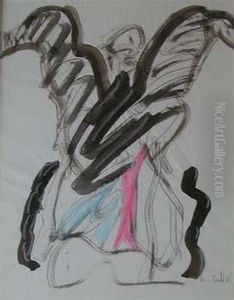Karl Barth Paintings
Karl Barth was a Swiss Reformed theologian who is most well-known for his significant contributions to Christian theology in the 20th century, rather than for any involvement in the visual arts. Born on May 10, 1886, in Basel, Switzerland, Barth grew up in a religiously oriented family, which laid the foundation for his future theological pursuits. He studied theology at the University of Bern, Berlin, Tübingen, and Marburg, and was initially influenced by the liberal theological trends of the time. However, his theological direction took a dramatic turn following his reaction to the support that many theologians and the church gave to German nationalism and the First World War.
Barth's theological reorientation led him to write the commentary 'The Epistle to the Romans' (Der Römerbrief), which was published in 1919 and significantly challenged the prevailing liberal theological assumptions of his day. This work marked a departure from the historical-critical method of interpreting scripture and instead emphasized the transcendence of God and the reality of God's revelation in Jesus Christ. Barth's theology continued to develop, and he became a leading figure in the dialectical theology movement, which stressed the paradox and mystery of God's nature and revelation.
Perhaps Barth's most monumental work is his thirteen-volume 'Church Dogmatics' (Kirchliche Dogmatik), which he wrote over the span of 35 years, from 1932 until his death in 1968. In this comprehensive work, Barth elaborated on key doctrines of the Christian faith, including the Word of God, the doctrine of the Trinity, creation, reconciliation, and redemption. His work was characterized by a Christocentric approach to theology, emphasizing Jesus Christ as the definitive revelation of God, which stands in contrast to any human attempt to know God apart from Christ.
Barth's opposition to the Nazi regime and his role in the Confessing Church further distinguished his career. He was a primary author of the Barmen Declaration in 1934, which opposed the German Christian movement's attempt to align the church with National Socialism. Due to his stance, Barth was forced to leave Germany in 1935 and returned to Switzerland, where he continued his teaching and writing career at the University of Basel until his retirement.
Karl Barth passed away on December 10, 1968, in Basel. Though primarily a theologian, his work has had a profound and lasting impact on the field of theology, influencing a wide range of Christian denominations and sparking dialogue across theological divides. His emphasis on the sovereignty of God, the centrality of Christ, and the importance of the biblical witness continues to be a significant source of theological reflection and debate.
